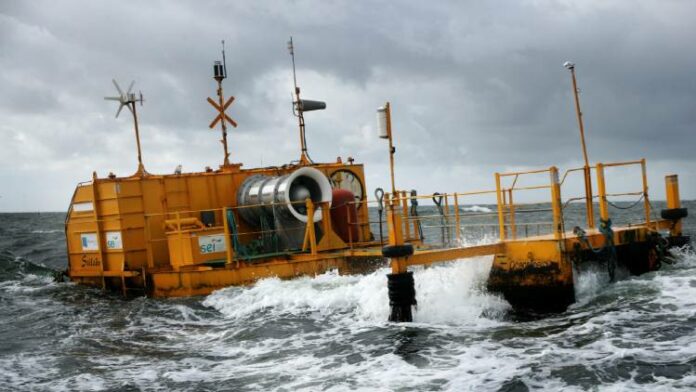The Oceanera consortium partners have announced €8m in funding for eight marine energy research and demonstration initiatives.
The projects will test and validate new technologies for wave, tidal and ocean thermal energy generation.
The results of the Joint Call 2017, funded by Oceanera and the European Commission, were publicly announced by Scotland Energy Minister Paul Wheelhouse.
Scottish Enterprise team leader in energy and clean technologies Jan Reid said: “Oceanera is an EU-funded project that aims to support demonstration projects which will address the current challenges in the ocean energy sector and support the development of the first commercial devices and arrays.”
We are delighted to announce eight of the projects selected under the co-funded Joint Call.
The companies involved represent leading developers in ocean energy and supply chain companies who, working together, aim to demonstrate a range of solutions which will have potential application across the sector, said Reid.
She added: “We would like to thank all the Oceanera partners and the Scottish government for their support in bringing together this exciting suite of projects.”
European Commission research policy officer Matthijs Soede said: “It is great to see national and regional funding organisations working together to help the ocean energy sector.”
In this way developers can work easier together with international suppliers and research institutes. Cooperation is important to bring the sector to the market.
The total grant funding approved for companies and research organisations involved in projects is €7.8m with €2.6m coming from the European Union as co-funding with the national and regional funding organisations.
These include Scottish Enterprise, the Sustainable Energy Authority of Ireland, the Swedish Energy Agency, Region Pays de la Loire, Region Bretagne and Centro Para el Desarrollo Technologico Industrial, in Spain.
Out of all the projects, five involve Scottish partners, with total grants of £2.7m made up of funding from the European Union and Scottish government.
The eight projects are:
Systematic evaluation and analysis of blades for a 2MW floating tidal energy converter (SEABLADE): Irish company EireComposites, working with Scottish tidal developer Orbital Marine Power, is leading the project that will accelerate the development of a commercial-ready, cost-effective tidal blade product by testing on 2MW Orbital turbine. Gathering sufficient test data to validate a 20-year design life for the blades will result in more reliable blades that will lead to reduced maintenance and increased productivity and revenue.
Targeted optimal pitch module for floating tidal energy (TOPFLOTE): Led by Scottish tidal energy developer Orbital Marine Power in partnership with Swedish supply chain company AB SKF, the project will design, fabricate and test a blade pitch regulation module for floating tidal generation units.
Two units will be incorporated for performance testing into Orbital Marine Power’s upcoming floating 2MW tidal turbine. Integration of a two-bladed pitch system module will enable optimal performance of the drive-train and deliver a number of direct and indirect cost benefits.
Resource characterisation to reduce the cost of energy through coordinated data enterprise (RESOURCECODE): Led by the Orkney based European Marine Energy Centre, with the University of Edinburgh and partners in France and Ireland, the project will create an integrated marine data toolbox that will enable developers of ocean energy devices and arrays, and their suppliers, to make optimised technical and commercial decisions.
Competitive Foundation for Tidal Turbine (CF2T): Brittany-based tidal company Sabella is leading the project with partners in Spain and Sweden, which will investigate ways of reducing capital expenditure costs and improving reliability of the foundation structure for a tidal turbine, to reduce overall cost of energy. It will have three main components – hybrid material, modular foundation and monitoring frameworks – to improve reliability of the foundation.
Innovative Thermal Exchangers (INNOTEX): Led by French company Naval Energies, with a Spanish partner, the project will validate the performance a heat exchanger technology that will contribute to future development of ocean thermal energy conversion plants.
Wave energy converter for offshore small power applications (SPhorcis): Spanish company Smalle Technologies, working with SmartBay Ireland, is developing a technology that will harvest wave energy from two axes instead of just one, to give new scope for off-grid low power production, which has many applications, including supplying energy for offshore equipment.
Universal mooring, anchor & connectivity kit demonstration (UMACK): Led by Swedish wave energy developer CorPower Ocean with Scottish partners Sustainable Marine Energy, TTI Renewables, European Marine Energy Centre and the University of Edinburgh, the project will develop and demonstrate a technical anchor for multiple sea-bed types.
The project also includes a quick connect solution, alongside the CorPower power take-off system, to de-risk the overall demonstration of full-scale devices ahead of full system demonstration of the CorPower device.
Wave+ Energy Project (WEP): Neureus Technologies from Spain is working with partners from France, the Canary Islands and Scotland to deliver smoothed and code compliant power to an established electrical grid through the operation of the point absorber wave energy technology in conjunction with a newly designed energy storage system.
The consortium has also announced that it will be running a second joint call for projects, due to open in early 2019.
Source:renews



